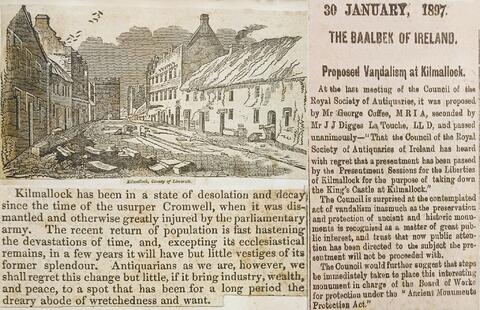Cote
Titre
Date(s)
- 30 Jan. 1897 (Création/Production)
Niveau de description
Étendue matérielle et support
1 p.; clipping
Nom du producteur
Histoire archivistique
Source immédiate d'acquisition ou de transfert
Portée et contenu
Clippings of articles relating to Kilmallock in County Limerick calling attention to the state of some of the town’s historic medieval buildings. The description of Kilmallock as ‘the Baalbek of Ireland’ is attributed to the Reverend Thomas Campbell (1733-95), a Church of Ireland clergyman and antiquarian, in his ‘A philosophical survey of the south of Ireland’ (1777). Baalbek is a city situated in modern-day Lebanon, renowned for its ruined Roman temple complex (now a UNESCO world heritage site).
Évaluation, élimination et calendrier de conservation
Accroissements
Mode de classement
Conditions d'accès
Conditions de reproduction
Langue des documents
Écriture des documents
Notes de langue et graphie
Caractéristiques matérielle et contraintes techniques
Instruments de recherche
Existence et lieu de conservation des originaux
Existence et lieu de conservation des copies
Unités de description associées
Note
Kilmallock was a settlement of considerable importance in the late medieval period, ranking as one of the main urban areas in Anglo-Norman Ireland. Among the medieval buildings referenced in the article is King’s Castle (also known as King John’s Castle), a four-storey tower house located in the centre of Kilmallock. Other historical buildings include the ruins of the Collegiate Church of St Peter and St Paul. The church was built in the thirteenth century on the site of an earlier monastery reputed to have been founded by Saint Mocheallóg in the early seventh century (Killmallock’s name derives from the Irish ‘Cill Mocheallóg’ meaning ‘the church of Mocheallóg’). St. Saviour’s Priory (Kilmallock Abbey) dates to the thirteenth century and is among the best-preserved Dominican foundations in Ireland. As Kilmallock was located in a position of some strategic importance, the town was frequently ravaged in times of war particularly during the Cromwellian invasion in the seventeenth century. Both the Collegiate Church of St Peter and St Paul and Kilmallock Abbey suffered grievous damage when attacked by the English Parliamentary Army.

